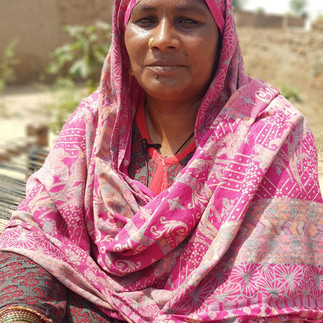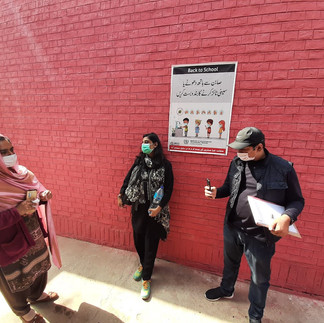Breaking Stereotypes: Inspiring Stories of WASH Ambassadors in UNICEF's Project Captured in 360 VR
- Syed Zeshan Ahmed
- Mar 30, 2021
- 3 min read
Updated: Feb 22
Black Production Films and White Rice collaborated to produce a series of 360 VR short documentary films for UNICEF, using virtual reality to drive social impact. These documentaries bring to life the human stories behind UNICEF's ASWA II project in Jhang, Punjab, which addresses open defecation through Water, Sanitation, and Health (WASH) protocols. Unlike traditional media, VR creates a powerful bridge of empathy, allowing viewers to momentarily step into someone else’s world and experience their reality firsthand.
One of the inspiring stories presented in the films is that of Nida Mumtaz, an adolescent student from Jhang. She is on a mission to spread key WASH messaging and serve as a beacon of inspiration for her peers and community members. In the 360-degree VR film, viewers can witness how Nida is doing her job as a WASH Ambassador and inspiring her community to build latrines. Through UNICEF's WASH interventions in schools, adolescent girls like Nida are empowered to become agents of change in their communities.
One of the VR films highlights the story of Perveen Bibi, a resident of Ahmedpur Sial, Jhang, who defied the odds to bring change to her community. Living in poverty, her family struggled with food scarcity—chicken and pulses were an unattainable luxury, and their daily diet consisted of water and bread made from low-quality flour, with curry only on lucky days when she could afford two spoonfuls of yogurt for ten rupees.
In a region where many families forego constructing latrines due to a lack of awareness and funds, Perveen Bibi recognized the urgent need for proper sanitation, especially for her daughters' safety. Determined to make a difference, she took matters into her own hands. By harvesting wheat for others and milking her neighbor’s cow, she saved enough over three months to build a toilet for her home—breaking stereotypes and becoming a force for change in her community. The 360-degree VR film captures her inspiring journey and the lasting impact of her actions.
The recce for the documentary films was conducted by Syed Zeshan Ahmed from Black Production Films, Usman Zahid, COO of White Rice, and Aadarsh Laghari from UNICEF. During the recce, the team identified suitable locations and key individuals who were fit for the story and could handle the challenges of filming in 360 VR.
A few months later, the team went to Punjab for filming. One of the biggest challenges they faced was the extreme heat, but the team persevered to capture the stories they wanted to tell. Another challenge was that the subjects were often awkward while facing the 360 VR camera alone while the team was hiding. To overcome this situation, the team came up with a technique. They shot the same location without the subject and then masked out the team present on the other side with that footage. This technique worked and allowed the subjects to feel more comfortable and natural in front of the camera.
The final result was four short documentary films that turned out to be amazing, and the team's experiment with 360 VR worked well. The films showcased the inspiring stories of Nida Mumtaz and Parveen Bibi, and the team's efforts to overcome the challenges of filming in 360 VR allowed them to create an immersive and engaging experience for viewers. To experience the amazing and immersive VR content, visit the website of Black Production Films. Through their innovative approach to Virtual Reality, they aim to highlight important issues and inspire positive change.










































Comments